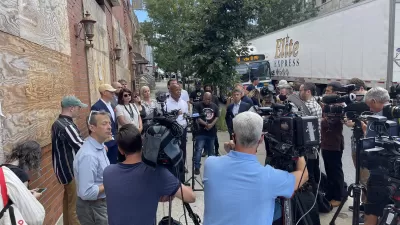If you can make it past rhetoric around healthcare, abortion, collective bargaining, and immigration, the November 8th election results tell a more cohesive and calming story about American’s political sentiment.
If you can make it past rhetoric around healthcare, abortion, collective bargaining, and immigration, the November 8th election results tell a more cohesive and calming story about American's political sentiment. Despite a widespread expressed attitude of "throw the bums out," incumbent mayors won in every big city race on the ballot yesterday: Baltimore, Charlotte, Houston, Indianapolis, and Philadelphia. (Even interim appointed San Francisco Mayor Ed Lee won his first election to the office.)
This trend signifies an ability on the part of voters to distinguish between a diffuse notion of "government" at the state and federal levels (which scores high marks for dissatisfaction), and the kind of government that is visible on the ground in the form of local elected officials. While the Occupy Wall Street movement has a tendency to be at least skeptical of government power (and in some cases of open confrontation downright hostile towards the notion of statism), the Tea Party movement has also contributed in the past two years towards a national dialogue of reducing the scale and impact of government. Yesterday's results, however, demonstrate the limits to anti-statist thinking: it's easy to oppose a nebulous and complex omnibus spending bill in a far-away and exotic sounding Washington, but harder to say that you want the government to stop interfering when it means not delivering services on the ground in your community.
One race that I followed closely was the Phoenix mayor's race. Incumbent Phil Gordon was term limited, creating Phoenix's first open mayoral election in many years. Losing candidate Wes Gullet was a Daniel Rose Fellow in the inaugural class of the program at the Urban Land Institute, and I got to know him through that work. Wes came in May to the ULI Spring Council Forum in Phoenix and spoke to a group of current Daniel Rose Fellows about how his experiences with ULI and the Daniel Rose Fellowship inspired him to run for Mayor. When he started the fellowship, Wes was Chair of the Planning Commission, and his work with ULI in re-examining the city's new TOD overlay led him to see how little awareness of controversial land use issues there was in public discourse in the city. Especially in the context of Phoenix's red hot recent debates about immigration, it's easy to see how more mundane issues like land use fall from the media's and the public's interest, but if yesterday's results show us anything, it's that local officials are well-served by highlighting their truly local impacts, rather than resting on a platform cobbled together from positions on national issues like abortion and healthcare. (For the sake of disclosure, Houston Mayor Annise Parker, Charlotte Mayor Anthony Foxx, and Philadelphia Mayor Michael Nutter are all also alumni of the Daniel Rose Fellowship program.)
Today's current economic context does not make the job of governing easy for mayors. Dwindling tax revenues, stagnant housing markets, increased demand for social services, meager employment statistics, and the need to make tough decisions about public service cuts make the job particularly challenging. Indeed, last year saw fifty-seven mayoral recall elections, out of 1,298 cities with populations of 30,000 or more (according to the U.S. Conference of Mayors). In many cases across the country yesterday, incumbent mayors did not elicit very serious competing candidates. With less than stellar voter turnout, these uncompetitive races may not have lit the fire that candidates and campaigners hoped for, but the lack of serious challenging contenders and low turnout should be read as a taciturn acceptance that while not every choice of a local elected leader may be popular, some unpopular decisions might just be what it takes to govern in today's climate.
Perhaps the most apropos representation of yesterday's results was the re-election of Charleston Mayor Joe Riley to his tenth term in that office. With 67 percent of the vote, and a glowing full page article in Sunday's New York Times, Mayor Riley stands as a potent symbol of everything that citizens hope for in a relationship with their local elected officials. His campaign is one of the few examples where national attention that has been showered upon him, his work on improving Charleston, and national initiatives like the Mayors' Institute on City Design tended to carry as much or more weight than more controversial local issues like a discussion about regulating the cruise ship industry in Charleston (and issue that Mayor Riley's opponents focused on). If politics is really all local, then Mayor Riley stands as an exception, or at least he's elevated the value of his local track record to reach a national audience hoping for a sense of a politician that represents a friendlier face of government than the diffuse enemies of the anti-government diatribes across the nation.
Follow a live updated list of mayoral election results at the U.S. Conference of Mayors.

Maui's Vacation Rental Debate Turns Ugly
Verbal attacks, misinformation campaigns and fistfights plague a high-stakes debate to convert thousands of vacation rentals into long-term housing.

Planetizen Federal Action Tracker
A weekly monitor of how Trump’s orders and actions are impacting planners and planning in America.

San Francisco Suspends Traffic Calming Amidst Record Deaths
Citing “a challenging fiscal landscape,” the city will cease the program on the heels of 42 traffic deaths, including 24 pedestrians.

Defunct Pittsburgh Power Plant to Become Residential Tower
A decommissioned steam heat plant will be redeveloped into almost 100 affordable housing units.

Trump Prompts Restructuring of Transportation Research Board in “Unprecedented Overreach”
The TRB has eliminated more than half of its committees including those focused on climate, equity, and cities.

Amtrak Rolls Out New Orleans to Alabama “Mardi Gras” Train
The new service will operate morning and evening departures between Mobile and New Orleans.
Urban Design for Planners 1: Software Tools
This six-course series explores essential urban design concepts using open source software and equips planners with the tools they need to participate fully in the urban design process.
Planning for Universal Design
Learn the tools for implementing Universal Design in planning regulations.
Heyer Gruel & Associates PA
JM Goldson LLC
Custer County Colorado
City of Camden Redevelopment Agency
City of Astoria
Transportation Research & Education Center (TREC) at Portland State University
Jefferson Parish Government
Camden Redevelopment Agency
City of Claremont






























